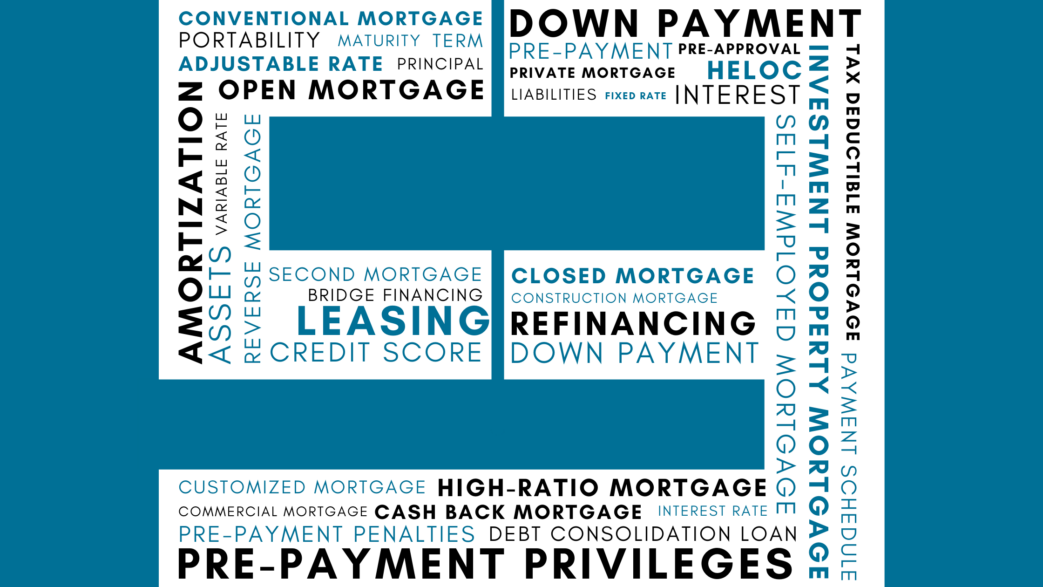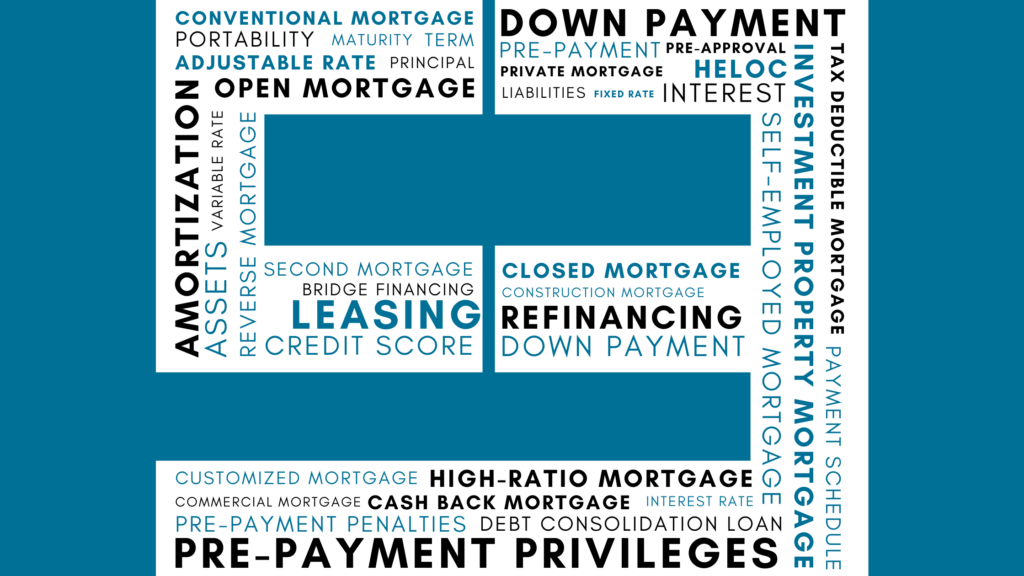The mortgage world is complicated. Fortunately, that’s why I’m here. Before we start working together, get familiar with the language. Here is a full list of terms and their definitions mortgage brokers use. Looking forward to speaking the same language.
Mortgage Terms
Amortization Period
The Amortization period represents the period of time it will take for you to repay your mortgage in full, typically ranging from 15 to 25 years. A longer amortization period means lower payments, but you’ll pay more interest during the period of time. The opposite is true for a shorter period.
Assets and Liabilities
Your Assets are your checking account, savings account, RRSP and investment balances. It also includes your vehicles and any property you own. Your liabilities are other mortgages you may have, any credit card debt, and outstanding loans. When you apply for a mortgage, your assets minus your liabilities decide whether you can afford your monthly payments.
Credit Score
Your credit score is a given number that represents your creditworthiness. Canada has 2 agencies offering these scores: Equifax and TransUnion. You may obtain a free copy of your personal credit report. Your credit score will determine what mortgage options you qualify for as well as the interest rate you will recieve.
Down Payment
Your Down payment an initial and up-front partial payment and can be obtained from a variety of sources. A homebuyer must have this available to secure a mortgage and typically ranges from 5%-25% of the total purchase price. A Borrowed or Flex Down Payment
allows you to buy a home using borrowed money.
Refinancing
Mortgage Refinancing describes a situation where you can pay off an existing mortgage and arrange a new mortgage, most often with a different lender.
Mortgage Term
A Mortgage term represents the length of time a mortgage agreement exists between a lender and borrower.
Interest
The Interest is the cost you’ll incur over a period of time, for borrowing money from a lender. It is paid in installments along with the repayment of the principal loan amount.
Interest Rate
The Interest rate is the rate at which you pay interest to the lender, calculated as a percentage of the principal amount, In Canada, interest rates on mortgages are compounded twice per year.
Leasing
A Leasing agreement is a contract between an owner and a renter, sometimes with the option to purchase the property, at the end of the lease period.
Maturity Date
The maturity date represents the end of the mortgage term. At the maturity date, you can typically choose to repay the principal balance or renegotiate the mortgage with current interest rates.
Mortgage
A mortgage is a type of loan that uses the home you buy a security. A mortgage loan is a legal document against the title of your property.
Mortgage Broker
A mortgage broker is a mediator between a borrower and a lender.
Mortgage Insurance
Mortgage insurance protects the lender from default on a high-ratio mortgage. There are three mortgage insurers in Canada: AIG, Canadian Mortgage and Housing Corporation (CMHC), and Sagen.
Mortgage Life Insurance
The option to buy Mortgage Life insurance gives the homeowner peace of mind that the mortgage would be paid off in full should the homeowner die or become disabled.
Mortgage Options
Types of mortgage options are available to fit your unique needs and circumstances. Read further to learn about the different types.
Payment Schedule
Your payment schedule will be the frequency you will make your mortgage payments. You’ll be given the option to choose monthly, semi-monthly, bi-weekly, or weekly payments. More frequent payments generally result in lower interest over your mortgage term and can shorten it significantly.
Pre-Approval
Mortgage pre-approval qualifies an individual for a specific loan amount before he or she begins to look for houses, based on how much money the lender is willing to lend to the borrower. It also guarantees their mortgage at the current interest rate for a period of 120 days.
Pre-Payment
A Pre-payment occurs when the homeowner pays off the remainder of their mortgage before the term is up.
Pre-Payment Penalties
Some mortgage products give penalties to the borrower for paying off their mortgage early. They can be equal to three months of interest or the interest rate differential.
Pre-Payment Privileges
Certain mortgage products allow the homeowner to make mortgage payments on top of their regular mortgage payments without a penalty. These additional payments may include doubling up on a monthly payment, increasing monthly payments, and paying off part of their mortgage principal up to a certain percentage.
Principal
The principal is the amount of a mortgage loan, not including the interest.
Types of Mortgages
Adjustable-Rate Mortgage
An adjustable-rate mortgage experiences fluctuations in the interest rate and monthly payments based on market interest rates. As the interest rate adjusts up or down, payment amounts adjust accordingly so that the amortization period remains the same. This method should be used carefully, as changes in payment amounts could present an issue for those on a tight budget.
Cashback Mortgage
A Cashback Mortgage offers a homebuyer a lump sum of cash at closing. This option allows you the freedom to cover moving expenses, renovations, and lawyer’s fees.
Closed Mortgage
A Closed Mortgage offers fixed payment amounts and longer amortization periods (The time that it will take for you to repay your mortgage in full – more below). This option gives homeowners a regular monthly payment and peace of mind. On the other hand, it does limit the amount and frequency of payments you can make on your home and you can be charged a penalty if you choose to pay off your mortgage before the end of your term.
Commercial Mortgage
A Commercial mortgage is obtained by using real estate as collateral.
Construction Mortgage
A Construction mortgage funds construction or renovation projects and is also secured by using real estate as collateral.
Conventional Mortgage
A Conventional mortgage requires a minimum 20% down payment not exceeding 80% of the property value (the lesser of the purchase price or appraised value).
Customized Mortgage
A Customized mortgage does not meet conventional criteria and its terms include zero down, is tax-deductible, includes cashback, and more.
High-Ratio Mortgage
A High-Ratio mortgage is one that is more than 80% and up to 95% of the home’s value (the lesser of the purchase price or appraised value). This type of mortgage must be insured to prevent borrow default and the premium can be paid in advance or included in the loan amount.
Investment Property Mortgage
An Investment Property mortgage is considered specialty financing helping to facilitate a real estate investment. Terms are generally different than those for traditional mortgage properties, so it’s wise to work with a mortgage broker when obtaining this type of mortgage.
Open Mortgage
An Open mortgage is a shorter-term mortgage option allowing you to make lump sum payments or pay off your entire mortgage with no penalties or additional fees. This option generally comes with a shorter-term and higher interest rate.
Private Mortgage
A Private mortgage is offered by a privately-owned corporation or an individual, as opposed to a conventional lender.
Reverse Mortgage
A Reverse mortgage benefits persons over 60 years of age by offering a lump sum of cash. In exchange, the lender receives up to 40% of the homebuyer’s home equity.
Second Mortgage
A Second mortgage is an additional mortgage on a property that is already mortgaged.
Self-Employed Mortgage
A self-employed mortgage is designed for entrepreneurs who cannot prove their income in the traditional way.
Tax Deductible Mortgage
A Tax-deductible mortgage allows your mortgage payments to generate tax refunds for you.
Variable Rate Morgage
A Variable Rate mortgage is a fixed mortgage option where the interest rate will only fluctuate with changes in the prime rate. When rates go up, the majority of your payment goes toward interest. When rates go down, the majority goes toward your principal.
Types of Loans and other Financing
Bridge Financing
Bridge financing is a credit form often secured to bridge the time between the sale of your property and the purchase of another.
Debt Consolidation Loan
A Debt Consolidation loan combines your debt allowing you to make one monthly payment.
Fixed-Rate Mortgage
In a fixed-rate mortgage, the interest rate is fixed only for a specific amount of time. The mortgage term can range from 6 months to 10 years and during the amortization period, more of the payment counts towards the principle.
Home Equity Line of Credit
A Home Equity Line of Credit (HELOC) offers homeowners at least 35% of the equity in their home and resembles a personal line of credit.


